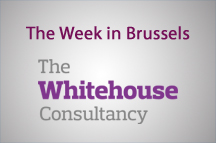 Away from Brexit and Trump and more into Eurobubble matters, Transparency International this week published a report examining - what else? - the revolving door phenomenon. An issue that makes the rounds from time to time, much like a revolving door, the report looked into “the career paths of those 485 former members of the European Parliament and 27 Commissioners who were in office during the last mandate and have since left the EU institutions”. Strikingly, Transparency International notes that “30% of MEPs who have left politics now work for organisations on the EU lobby register. For European Commissioners, the share is more than 50%.”
Away from Brexit and Trump and more into Eurobubble matters, Transparency International this week published a report examining - what else? - the revolving door phenomenon. An issue that makes the rounds from time to time, much like a revolving door, the report looked into “the career paths of those 485 former members of the European Parliament and 27 Commissioners who were in office during the last mandate and have since left the EU institutions”. Strikingly, Transparency International notes that “30% of MEPs who have left politics now work for organisations on the EU lobby register. For European Commissioners, the share is more than 50%.”
Shocking? Hardly, really. If anything, it is odd that the numbers are not higher. The explanation is simple: as Transparency International acutely observes (and as is well known to anyone even remotely involved in EU affairs), “the demand for policy insiders is high, particularly among lobbying outlets.” To this, we can also add the question what is an MEP, Commissioner or staffer to do after leaving office? Even assuming we are talking about a doctor, engineer, or anyone who has not had a politics-only background, would it really be possible to go back to this job after five or more years of working full time as a politician? Catching-up would be nigh impossible, hence, the easy option is taking advantage of the insider knowledge gathered. Supply and demand, a match made in heaven.
 Does this mean that gamekeepers-turned-poachers exercise undue influence? Possibly, but not always. Contacts matter in the public affairs industry, but it is also something that can be built over time. There will of course be cases where a former commissioner would be able to “get their successor on the phone” or an MEP can help “get you in front” of their former colleagues. The truth of the matter is, though, that having a policy insider on your roster, looks good on a company website. It helps reassure clients that “you mean business”.
Does this mean that gamekeepers-turned-poachers exercise undue influence? Possibly, but not always. Contacts matter in the public affairs industry, but it is also something that can be built over time. There will of course be cases where a former commissioner would be able to “get their successor on the phone” or an MEP can help “get you in front” of their former colleagues. The truth of the matter is, though, that having a policy insider on your roster, looks good on a company website. It helps reassure clients that “you mean business”.
Bragging about contacts and connections is not uncommon among public affairs professionals, but it is often nothing more than bragging. For all that connections and contact lists are cut out to be, public affairs, and especially EU public affairs, mostly involves detailed research, intelligence gathering, correct identification of who you should be talking to and persistence in chasing meetings. It can be surprising to a new recruit how open policy makers are at receiving representations from different organisations, provided you present yourself professionally and tailor your approach accordingly. Former policy insiders can sometimes offer a shortcut to this, but that is usually it.
Does this mean that calls to strengthen transparency, for example by extending “cooling-off” periods for former office-holders or prohibiting them from lobbying activities are meaningless? Hardly. Transparency in who meets whom and a register of lobbying activity in the EU are important and have been strongly supported by the public affairs industry itself. At the same time, it is important to not over-estimate the actual influence former office holders can exercise.












